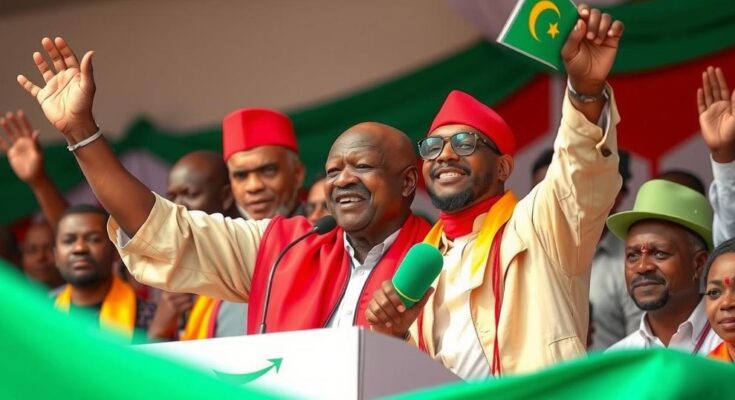Chad’s ruling Patriotic Salvation Movement won 124 of 188 seats in a contested parliamentary election boycotted by opposition parties. The election, held on December 29, 2023, registered a 51.56 percent voter turnout, raising doubts about its legitimacy. President Mahamat Idriss Deby proclaimed it a crucial move toward democracy following his military rule since 2021, amidst ongoing security challenges and shifting international relations.
Chad’s ruling party, the Patriotic Salvation Movement, has claimed a significant majority in the parliamentary elections held on December 29, 2023, according to provisional results. The elections, which were largely boycotted by opposition groups, resulted in President Mahamat Idriss Deby’s party obtaining 124 of the 188 available seats in the National Assembly, a win announced by Ahmed Bartchiret, the head of the electoral commission. The voter turnout was reported at 51.56 percent, prompting concerns from opposition parties regarding the legitimacy of the electoral process.
The December elections marked Chad’s first parliamentary contest in over a decade and were touted by President Deby as a critical step towards establishing a democratic framework following his military takeover in 2021, following the death of his father, former President Idriss Deby Itno. The governing party described the elections as essential for allowing decentralization, a power-sharing initiative aimed at distributing authority from the national to local governments. However, opposition parties, including the Transformers party, dismissed the elections as a “charade,” raising alarms about potential electoral malpractice similar to what was witnessed during the previous presidential elections, which were deemed not credible by international observers.
Chad is currently facing several ongoing security challenges, including threats from the Boko Haram militant group and a shift away from military cooperation with France, its former colonial power. This trend mirrors the actions taken by other Sahel nations that have recently expelled French troops and increased collaboration with Russia in light of recent political upheavals. Additionally, security forces in Chad recently thwarted a purported destabilization attempt targeting the presidency, underscoring the country’s precarious political environment.
Chad has experienced significant political turmoil and upheaval, especially following the transition of power from long-time leader Idriss Deby Itno to his son, Mahamat Idriss Deby. This transition, which occurred after Idriss Deby’s death in 2021, raised questions about the legitimacy and intentions behind the new administration. The current government has been portrayed as attempting to navigate a pathway to democracy, yet the recent parliamentary elections, characterized by a boycott from the opposition, have led to concerns regarding their validity and transparency. The ongoing security challenges in the region, exacerbated by militant attacks and shifting alliances, add further complexity to Chad’s political landscape.
In conclusion, the parliamentary elections in Chad, dominated by the ruling Patriotic Salvation Movement, have drawn significant criticism due to low voter turnout and widespread opposition boycott. While the government claims these elections are a step towards democratic governance, concerns linger regarding their authenticity and the political implications amidst ongoing security concerns. This situation reflects a broader regional trend where countries are reevaluating their international alliances and dealing with internal pressures for governance reform.
Original Source: www.aljazeera.com




